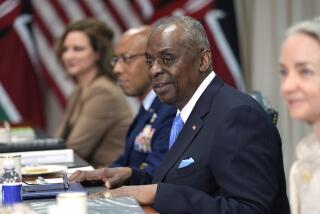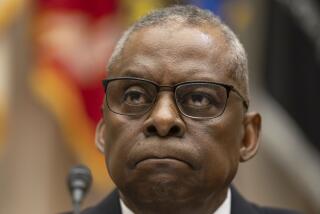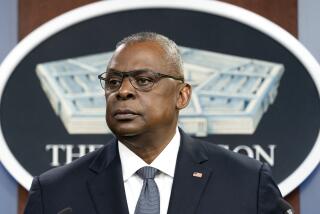Lawmakers zero in on Army surgeon general
WASHINGTON — On frequent trips to Walter Reed Army Medical Center, Rep. C.W. “Bill” Young said he and his wife found wounded soldiers who didn’t have adequate clothes, even one doing his rehabilitation in the bloody boots he had on when he was injured.
One soldier, ashamed that his mattress was soaked with urine, tried to turn Young’s wife away, the Florida Republican recalled Wednesday. Another with a serious brain injury fell out of bed and hit his head three times before someone was assigned to ensure it didn’t happen again.
On the third day of hearings on Walter Reed, Young told Lt. Gen. Kevin C. Kiley, the Army’s top medical officer, and other brass that he repeatedly took his concerns to officials. Young didn’t raise them in public, he said, because he didn’t want to undermine patients’ confidence or the military. But now he and other lawmakers want answers.
And there’s no one they hold more accountable than Kiley, who headed the U.S. military’s premier hospital from 2002 to 2004. Last week, Kiley was appointed interim commander of Walter Reed but was removed a day later. He remains the Army’s surgeon general.
“While we have dedicated people, they’re working in a system that is failing our soldiers,” Sen. Patty Murray (D-Wash.) said at the first of two hearings at which Kiley testified Wednesday. Calling Walter Reed “just the tip of the iceberg,” Murray detailed fresh reports of poor treatment at a military hospital in Washington state. “Gen. Kiley, you’re in charge of this system. I hold you accountable,” she said. “I’m here today because I want answers.”
Concerns about Walter Reed came to light after the Washington Post reported gaps in treatment and poor conditions in some facilities on the sprawling hospital campus, in particular an outpatient residential facility known as Building 18.
Kiley has told lawmakers he was unaware of specific problems in Building 18. He said in response to questions Wednesday that he had become aware of other problems at the hospital during and after his tenure there, and had acted to remedy them.
But, he acknowledged, he had not done enough. “I did fail,” Kiley said. “I should have been more engaged.”
In testimony this week, Kiley has sought to reassure lawmakers that physical problems such as mold growth and broken fixtures were being addressed. The last patient in Building 18 was scheduled to move out Wednesday night, he added.
Meanwhile, Kiley said, administrators are adding staff and reworking procedures to help ease the transition from hospital to outpatient care, where most of the problems have been.
The scandal has cost two high-ranking officials their jobs: Army Secretary Francis J. Harvey and the hospital commander, Army Maj. Gen. George W. Weightman. Some lawmakers Wednesday questioned Kiley’s leadership style and asked whether he too should be relieved of his command.
At the White House, former Sen. Bob Dole and former Health and Human Services Secretary Donna Shalala, who were appointed Tuesday to head a commission to study military and veterans medical care, met with President Bush.
“He made it very clear that if one soldier doesn’t get high-quality treatment and isn’t transitioned back into civilian life or back into the military, that’s unacceptable,” Shalala said, adding that she could sense Bush’s “anger and his anxiousness that we move as quickly as possible.”
Dole said the president planned to play an active role in the commission’s work.
After the meeting, Bush said, “Any report of medical neglect will be taken seriously by this administration, [and] I’m confident, by the Congress, and we will address problems quickly.”
Senate Majority Leader Harry Reid (D-Nev.) and House Speaker Nancy Pelosi (D-San Francisco) expressed support Wednesday for the commission. But they called on Bush to consult Congress on the committee’s makeup and urged him to include troops serving in Iraq and Afghanistan and their family members.
Meanwhile, the investigation on Capitol Hill will continue.
As he closed a House hearing at which Kiley faced heated questioning, Rep. John P. Murtha (D-Pa.) assured fellow lawmakers, “This is not the end of the story.”
*
More to Read
Get the L.A. Times Politics newsletter
Deeply reported insights into legislation, politics and policy from Sacramento, Washington and beyond. In your inbox three times per week.
You may occasionally receive promotional content from the Los Angeles Times.










